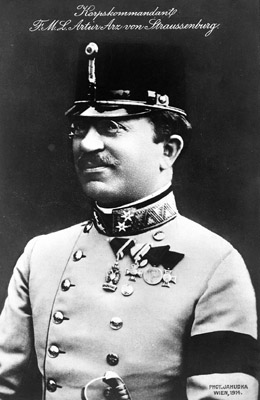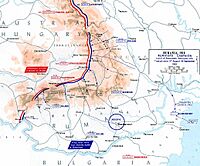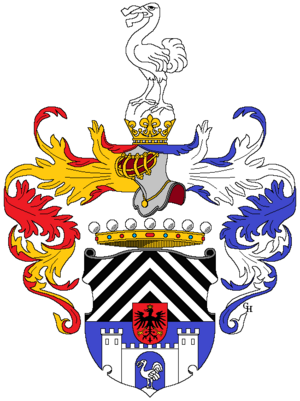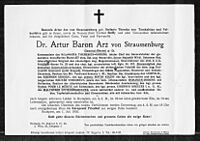Arthur Arz von Straußenburg facts for kids
Quick facts for kids
Arthur Arz von Straußenburg
|
|
|---|---|
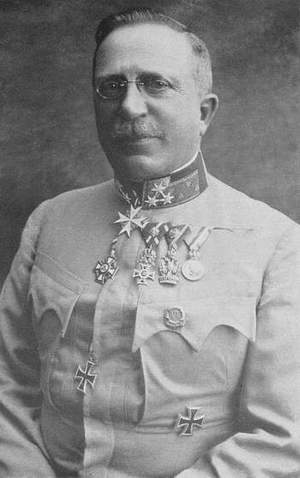
Arthur Freiherr Arz von Straußenburg in 1917
|
|
| Chief of the General Staff | |
| In office 1 March 1917 – 3 November 1918 |
|
| Monarch | Charles I |
| Preceded by | Franz Conrad von Hötzendorf |
| Succeeded by | office abolished |
| Personal details | |
| Born | 16 June 1857 Hermannstadt, Austrian Empire (present-day Sibiu, Romania) |
| Died | 1 July 1935 (aged 78) Budapest, Kingdom of Hungary |
| Awards | Military Order of Maria Theresa Pour le Mérite |
| Military service | |
| Allegiance | |
| Branch/service | Austro-Hungarian Army |
| Years of service | 1876–1918 |
| Rank | |
| Unit | 15th Infantry Division VI Corps 1st Army |
| Battles/wars | First World War
|
Generaloberst Arthur Freiherr Arz von Straußenburg (Hungarian: Báró Artúr Arz de Straussenburg; 16 June 1857 – 1 July 1935) was a high-ranking Austro-Hungarian general. He was the last Chief of the General Staff for the Austro-Hungarian Army. This was the top military leader position.
When World War I began, he led the 15th Infantry Division. He quickly rose through the ranks. He commanded the 6th Corps and then the First Army. He played a part in important battles like the Gorlice–Tarnów Offensive in 1915. He also fought in the Romanian campaign in 1916. In March 1917, he became Chief of the General Staff. He held this role until November 1918, when he stepped down.
Contents
Arthur Arz's Early Life
Arthur Arz was born in 1857 into a noble family. His family were among the early German settlers in Transylvania. His father was a preacher and a member of a high council.
Arthur went to school in Dresden and Hermannstadt. He did very well in his studies. He then went to university to study law. During this time, he volunteered for a year of military service. This was from 1876 to 1877.
Starting His Military Career
After his volunteer year, Arz passed an exam to become a reserve officer. He then successfully applied to become a regular officer. In 1878, he became a Leutnant (Lieutenant).
Arz became an Oberleutnant (First Lieutenant). He then attended the Imperial Kriegsschule (War School) in Vienna from 1885 to 1887. He did very well there too. In 1888, he joined the General Staff. This group plans military operations.
He was promoted to Hauptmann (Captain). He worked for a high-ranking general named Baron Schönfelda. Then, in 1898, he returned to the General Staff. He stayed there mostly until 1908.
Arz continued to rise in rank. He became a Major and then an Oberstleutnant (Lieutenant Colonel). He worked with the 2nd Corps, led by Archduke Eugen of Austria. On 1 May 1902, he became an Oberst (Colonel). In May 1903, he became the head of a department within the General Staff. That same year, he married Stefanie Tomka. They had a daughter together.
In 1908, Arz was promoted to Generalmajor (Major General). He was given command of the 61st Infantry Brigade. He was seen as a very promising and skilled officer. In 1911, Archduke Eugen gave him an "outstanding" review. In 1912, he was promoted to lead the 15th Infantry Division in Miskolc. Soon after, he became a Feldmarschall-Leutnant (Lieutenant Field Marshal). In 1913, he moved to the war ministry in Vienna to lead a section.
World War I Role
The Start of the War
When World War I began in 1914, Arz asked to be sent to the front lines. He was given command of the 15th Infantry Division again. This division fought in the final stages of the Battle of Komarów. Soon after, on 7 September, Arz took command of the 6th Corps. He replaced Boroević.
Leading the 6th Corps, Arz performed very well at Limanowa-Lapanów. His unit was part of the 4th Army. He also played a key role in the Gorlice-Tarnów Offensive. He was in command at Grodek-Magierow and Brest-Litowsk in the summer of 1915. In September 1915, he was promoted to General der Infanterie (General of the Infantry). He fought alongside Mackensen's German 11th Army. The Germans respected his skills as a commander.
The Romanian Campaign
When it seemed Romania might join the war on the Allied side, Arz was moved from the 6th Corps. On 16 August 1916, he was appointed to lead the newly organized 1st Army. He arrived in Kolozsvár (now Cluj-Napoca, Romania). Forces were gathering there to stop a possible Romanian attack into Transylvania. He famously said, "I am an Army Commander without an Army."
Indeed, when Romania declared war on 27 August, the 1st 'Army' had only about 10,000 men. This was about half a division. The Romanian advance was slow. Also, there was a lot of panic in Budapest. Because of this, the 1st Army quickly received many more soldiers. This helped push back the Romanian challenge from the south.
Romanian forces crossed the border on 28 August 1916. Six different groups pushed through six Carpathian passes. Their goal was to meet up in Brassó (now Braşov, Romania). By 4 September, they had reached near Sepsiszentgyörgy. To stop these six attacks, Arz, fighting on his home ground, sent in more divisions. At the same time, the Romanian North Army tried to advance along the Moldavian front. To counter this, Arz used more divisions.
Working with the German 9th Army, the Romanian invasion was stopped. Their forces were pushed back across the border within eight weeks. This earned Arz the respect of the new Austro-Hungarian emperor, Karl I. Other commanders also praised his achievements. Conrad wrote that Arz was "an energetic resolute leader in the most difficult situations." Boroević called Arz an "Honourable, noble character....outstanding general."
Arz remained in charge of the 1st Army until February 1917. This was after the main operations in Romania ended. He had help from Falkenhayn's German 9th Army and Mackensen's German Army of the Danube.
Chief of General Staff
Karl I of Austria became Emperor on 21 November 1916. This led to many changes in the government and military. One big change was that Conrad was replaced. Emperor Karl reportedly wanted a capable leader, not necessarily a "genius." Arz knew the Emperor. He was a good commander, and he was also good at talking with the Emperor. He didn't make the Emperor feel talked down to. Unlike Conrad, Arz was not very involved in politics. He was loyal to the Central Powers and trusted the Emperor completely.
After being appointed in March 1917, Arz tried his best to follow the Emperor's wishes. He acted as a personal advisor to the Emperor on army matters. He didn't push his own strategies as Conrad had done. During his time as head of the army, German control over Austro-Hungarian forces grew. This meant less independent action for Austria-Hungary. However, there were also important victories in 1917. These included clearing Galicia and Bukovina. There was also a major breakthrough at Flitsch Tolmein. And a great victory at Caporetto later that year.
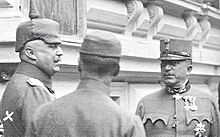
Arz was promoted to Generaloberst (Colonel General) on 26 February 1918. He was also given a noble title earlier that year. He was in charge of planning the invasion of Italy in the summer of 1918. Russia was out of the war, so he had many experienced soldiers. While planning, both Conrad and Boroević wanted to lead the attack. Neither Arz nor the army command could decide. So, they used a compromise suggested by the Emperor. Their forces were split and attacked Italian positions from two different directions. This led to a complete failure of the attack at the Piave River in June 1918.
Arz took full responsibility for the failure of the invasion. He offered to resign, but the Emperor refused. Even after another general said the army had lost faith in Arz, the Emperor still refused. By late October 1918, Arz knew that defeat was coming. He had made plans for an organized troop withdrawal. This was to prevent more unnecessary fighting if an armistice (a ceasefire) was signed. An armistice with Italy was agreed on 3 November 1918. It was to start 36 hours later. But because of poor communication, thousands of Imperial troops were captured. They thought they were already at peace.
End of the War
On the night of 2–3 November 1918, the Emperor gave up command of the armed forces. He wrote a note appointing Arz as his supreme commander. But Arz did not want the responsibility of handling the armistice. So, Kövess became commander-in-chief instead. However, Arz acted as the commander until Kövess could officially take over.
Life After the War
After the war ended, Arz moved to Vienna. He received a pension, but due to rising inflation, he soon faced financial difficulties. Many people blamed him for the armistice and the defeat at the Battle of Piave. The new First Austrian Republic even started an investigation against him, but it didn't lead to anything.
Transylvania and Bukovina became part of Romania after the war. This made Arz a Romanian citizen. But he refused to return to his home country. He had played a big role in its defeat and feared consequences. However, from January 1921, Romania did grant him a pension. This stopped in 1923 due to a new law. This law denied pensions to former Imperial and Royal military personnel who didn't live in Romania.
Living in poverty, Arz asked the Hungarian Prime Minister for help. He also asked for 72 other officers. His request was denied. He survived on money from a fund set up by former military friends. This fund helped officers in similar situations. In 1924, he published his memories of the war. In 1926, the Hungarian Government gave him a pension. After this, the support fund became the "Funds of the former General Staff." From 1931, Hungarian law required pensioners to live in Budapest. So, in 1932, he officially moved there. However, he still spent time in Vienna.
He became a Hungarian citizen in 1933. In 1935, Arz wrote another book about his war experiences. Unlike others, his work didn't try to justify himself or make political statements.
On 1 July 1935, while visiting Budapest to get his pension, he had a heart attack and died. He was buried with full military honors in Budapest.
Service Record
- May 1902 – Promoted to Oberst (Colonel)
- May 1903 – Head of the Management Bureau until November 1908
- November 1908 – Promoted to Generalmajor (Major General)
- November 1908 – Commands 61st Infantry Brigade until April 1912
- April 1912 – Commands 15th Infantry Division until April 1913
- May 1912 – Promoted to Feldmarschalleutnant (Lieutenant Field Marshal)
- April 1913 – Section chief of all military Departments in the War Ministry until September 1914
- September 1914 – Commands 15th Infantry Division until end of the month
- September 1914 – Commands VI Corps until August 1916
- September 1915 – Promoted to General der Infanterie (General of the Infantry)
- August 1916 – Commands 1st Army until February 1917
- March 1917 – Chief of the General Staff until November 1918
- February 1918 – Promoted to Generaloberst (Colonel General)
Awards
Arz received several awards from the Habsburg monarchy. The most important was being made a Commander of the Military Order of Maria Theresa. He also received the Pour le Mérite from the German Empire.
Works
- Arz von Straussenburg, A., The History of the Great War 1918 (Vienna, 1924)
- Arz von Straussenburg, A., Fight and Fall of the Empires (Vienna and Leipzig, 1935)
Images for kids
 | James Van Der Zee |
 | Alma Thomas |
 | Ellis Wilson |
 | Margaret Taylor-Burroughs |


